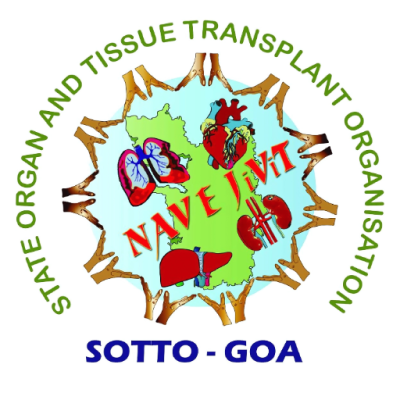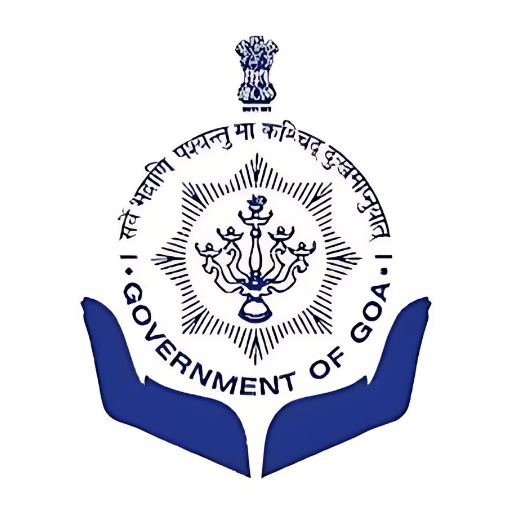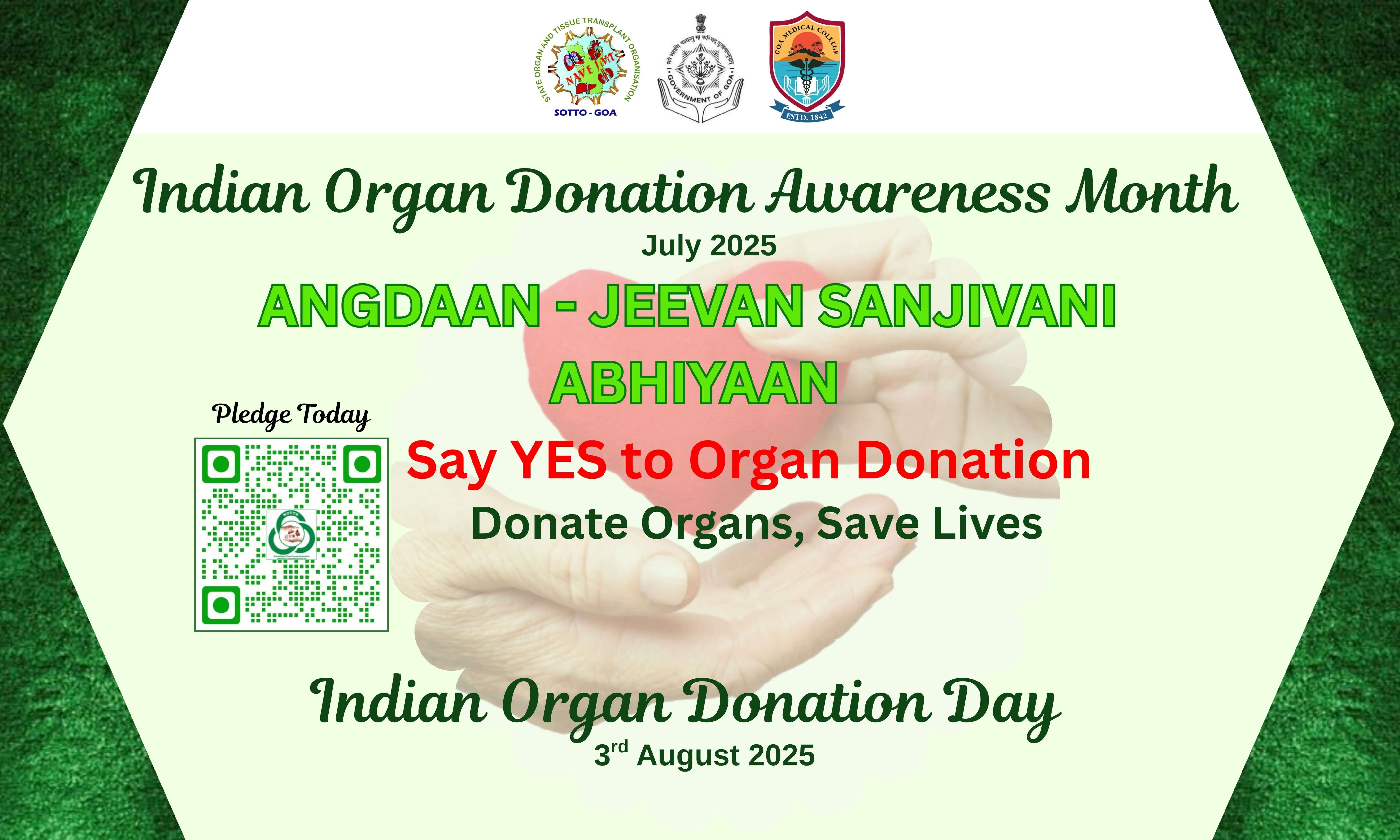
Frequently Asked Questions
What is Organ Donation?
Organ donation is a noble act, which gives an opportunity to save lives after death. An organ is a part of the body that performs a specific function like Heart, Lungs, Kidney, Liver, Pancreas, Intestine, etc. Many patients suffer from end stage organ failure; organ transplant is their only hope. The donated organs are transplanted into these patients for therapeutic purposes.
What is Tissue Donation?
Tissue is a group of cells that performs a particular function in the human body e.g., Cornea (Eye), Bones, Skin, Heart valves, Blood Vessels, Nerves, Tendon etc. Tissue Transplantation improves the quality of life.
What are the types of Organ Donation?
-
Living Organ Donation- A person, not less than 18 years of age, during his life, can voluntarily authorize the removal of organs for therapeutic purposes within the legal framework of the country.
He/she can donate one kidney (the other kidney is capable of maintaining the body functions adequately for the donor), a part of the liver (the segments of liver will regenerate after a period of time in donor)
Types of living organ donation are:
- Near Related Donors (Spouse / Parents / Children / Siblings / Grandparents / Grandchildren)
- Other than Near Related Donors (Altruistic)
- SwapDonors (Paired exchange)
- Deceased Organ Donation- A person, regardless of age can donate multiple organs/tissues and give life to many patients after brain-stem/cardiac death. Consent of near relative or a person in lawful possession of the dead body is required. If the deceased donor is under the age of 18 years, then the consent is required from one of the parents or any near relative authorized by the parents.
Is it possible to receive organs from a friend or other than near relative?
As per Transplantation of Human Organ Act (THOA) any living person other than near relative can also donate organ but only purely for the reason of affection and attachment towards recipient. There cannot be any financial transaction or coercion for this donation.
Approval of State level Authorization Committee is mandatory.Chairman of this committee notified is the Dean, Goa Medical College.
What is Organ Transplant?
Surgical removal of an organ from one person (donor) and placing it into another person (recipient). Transplantation is needed when the person’s organ has failed due to illness/ injury.
Which are End stage diseases that can be treated by organ/tissue transplantation?
| Diseases | Organs |
|---|---|
|
Heart failure (e.g. Cardio myopathy, Congenital anomalies etc.) |
Heart |
|
Terminal lung illnesses (e.g. ILD, Lung Fibrosis etc.) |
Lungs |
|
Kidney failure (e.g. CKD due o Diabetes Mellitus, Auto Immune Disease etc.) |
Kidney |
|
Liver failure (e.g. Cirrhosis, Hepatocellular Carcinoma etc.) |
Liver |
|
Diabetes Mellitus |
Pancreas |
|
Corneal Blindness (Corneal Opacity due to traumatic/ infection) |
Eyes |
|
Valvular Heart disease (Mitral valve) |
Heart valve |
|
Severe burns |
Skin |
|
Traumatic amputation of hand |
Hand transplant |
How quickly should donated Organs be transplanted?
The organs should be transplanted as soon as possible for a good outcome. However, due to logistics it is often not possible. Using preservative solutions, the organs are transported from retrieval centres to transplant hospitals.
| Organ | Time to Transplant |
|---|---|
|
Heart |
4 to 6 hours |
|
Lungs |
4 to 8 hours |
|
Intestine |
6 to 10 hours |
|
Liver |
12 to 15 hours |
|
Pancreas |
12 to 24 hours |
|
Kidney |
24 to 48 hours |
What is Brain Stem Death (BSD):
Brain stem is that part of brain that controls consciousness and breathing. Brain dead person is an unconscious (comatose) patient who cannot breathe on his own and is breathing through a ventilator. In brain death, the brainstem functions have permanently & irreversibly ceased. The blood pressure drops and eventually all the organs perfusion ceases and the heart stops beating.
Does coma and brain death mean the same?
No, coma and braindeath are different events. The difference between patients in coma and brain-dead patients is that comatose patients are unconscious (may wake up after weeks/months) and having spontaneous breathing whereas brain stem dead patients have irreversible unconsciousness (never wake up) and neither will regain breathing capability ever. The heart can continue to function due to ventilator for a few hours to few days & it is during this period that the organs can be retrieved after obtaining consent from the close relatives.
DEAD DONOR RULE is an ethical norm that lies at the heart of the deceased organ donation programme and it means (a)organ donors must be dead before organ retrieval begins (b)organ procurement itself must not cause death of the donor. Organs are never taken at the cost of donor's life.
How is the Brain Stem Death Certification Done?
Brain stem death is certified by the panel of experts from the field of neurosurgery, neurology, intensive care, anaesthesia, internal medicine and surgery approved by the state government. They are not members of the transplant team. The experts perform the BSD certification tests twice 6 hrs. apart as mandated by the THOA 1994. The brain death certification in the Form 10 (THOA Rules 2014) is documented. The time of death is the time of the 2nd positive apnea test. The vital organs are taken only after the person is certified brain stem dead.
What is Required Request?
The Doctor / Transplant Coordinator / Counselor request the next of kin to consider organ/tissue donation in the event of death (Brain stem Death/Cardiac Death).
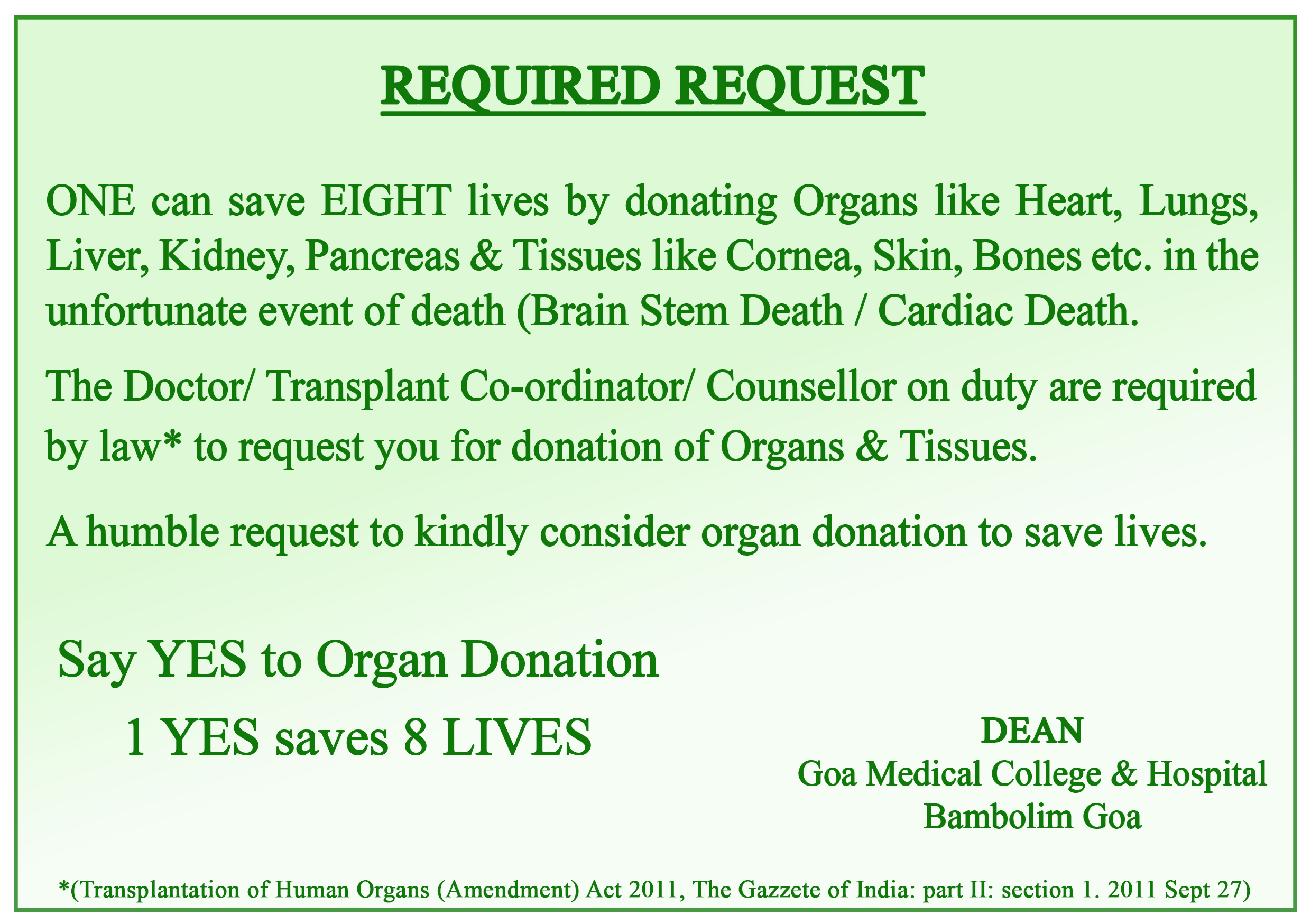
How to pledge as an Organ Donor ?
You may pledge to donate your organs by signing up as a donor on www.notto.mohfw.gov.in or Link: https://forms.gle/e52ENLLqSWQxjUXWA. For offline registration, kindly download Form 7 from our website and submit it to SOTTO Goa or email it to sotto[dash]goa[at]gov[dot]in. On the driving license application too, one can pledge as donor.
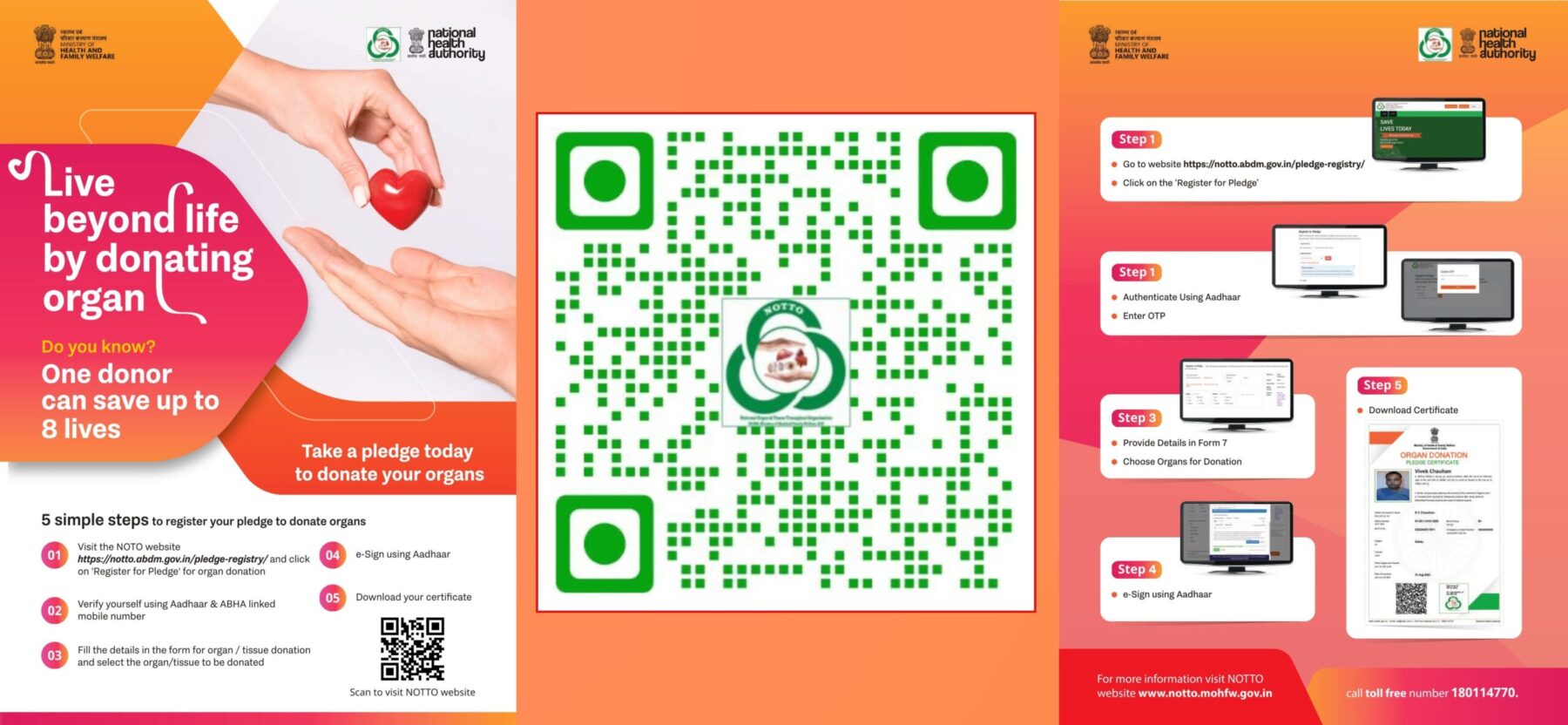
PLEDGE HAS NO LEGAL BINDING. NO CONSENT FROM FAMILY, NO DONATION
Is Organ Donation & Transplantation Legal?
Yes, Transplantation of Human Organs Act (THOA) 1994 regulates removal, storage and transplantation of organ for therapeutic purposes and prevents commercial dealings in human organs. Amendment 2011 THOTA & THOA Rules 2014 have been adopted by our state.
Whom to report any unlawful practices?
Kindly report it to the state appropriate authority viz. Secretary Health Government of Goa. No court other than that of a Judicial Magistrate of the first class shall try any offence punishable under this Act. The complainant is the state appropriate authority.
As per THOA 2011, offenses/punishments are as follows:
Punishment for removal of human organ & tissue or both without authorityup to 10 years and a fineup toRs. 5 lacs.Punishment for commercial dealings in human organ up to 5-10 years and a fine betweenRs. 20 lacs to Rs. 1 crore
Organ Donation-At Hospital or Home?
Organ Donation is only possible if the potential organ donor is admitted when the patient dies in the I.C.U. and is certified Brain dead. No vital organs can be retrieved if the death occurs at home.
Is there any Financial Transactions involved?
NO compensation or payment for donation of organs is permissible under THOA 1994.The family is not charged for any procedure/investigations after the consent for organ donation is given in private sector.
NO HUMAN ORGANS CAN BE BOUGHT OR SOLD.
Can one donate body to a teaching institution after organ & tissue donation?
Usually, Bodies are not accepted for teaching or research purposes after retrieval of organs / tissues or if there has been a post-mortem examination. However, if only the corneas are donated, a body can be used for this purpose.
How can you help in increasing Organ Donation?
• By becoming an organ donor, and talking to your family about your decision of saving lives of others.
• By promoting organ donation by motivating people at home, at work place, in your community and in your society.
If I have any medical condition can I pledge as an Organ Donor?
The medical suitability of the organ is determined at the time of Brain death. Irrespective of age and underlying medical conditions the organs are utilized if determined to be of normal function.
Whom should I contact to enlist for deceased donor organ transplant programme?
If you wish to undertake a transplant, kindly discuss with your treating phycisian. Your fitness evaluation will be performed as per institutional protocol and the transplant coordinator of the transplant hospital will enlist you. A score is generated by SOTTO as per medical criteria and enlisting is completed. The waiting list is blood group based viz. A, B, O, AB. For any further information (SOTTO Registration Number, Patient Rank, etc) kindly contact the Transplant coordinator.
What is Organ Donation?
Organ donation is a noble act, which gives an opportunity to save lives after death. An organ is a part of the body that performs a specific function like Heart, Lungs, Kidney, Liver, Pancreas, Intestine, etc. Many patients suffer from end stage organ failure; organ transplant is their only hope. The donated organs are transplanted into these patients for therapeutic purposes.
What is Tissue Donation?
Tissue is a group of cells that performs a particular function in the human body e.g., Cornea (Eye), Bones, Skin, Heart valves, Blood Vessels, Nerves, Tendon etc. Tissue Transplantation improves the quality of life.
What is whole body donation?
As per the Goa Anatomy Act 1976, Body Donation is as the act of giving one’s body after death for medical education & research. The donated bodies remain a principal teaching tool for anatomists, medical educators teaching gross anatomy and to carry out research.
What are the types of Organ Donation?
-
Living Organ Donation- A person, not less than 18 years of age, during his life, can voluntarily authorize the removal of organs for therapeutic purposes within the legal framework of the country. He/she can donate one kidney (the other kidney is capable of maintaining the body functions adequately for the donor), a part of the liver (the segments of liver will regenerate after a period of time in donor) Types of living organ donation are:
- Near Related Donors (Spouse/Parents/Children/Siblings/Grandparents/Grandchildren)
- Other than Near Related Donors (Altruistic)
- SwapDonors (Paired exchange)
-
Deceased Organ Donation- A person, regardless of age can donate multiple organs/tissues and give life to many patients after brain-stem/cardiac death. Consent of near relative or a person in lawful possession of the dead body is required. If the deceased donor is under the age of 18 years, then the consent is required from one of the parents or any near relative authorized by the parents.
Is it possible to receive organs from a friend or other than near relative?
As per Transplantation of Human Organ Act (THOA) any living person other than near relative can also donate organ but only purely for the reason of affection and attachment towards recipient. There cannot be any financial transaction or coercion for this donation.
Approval of State level Authorization Committee is mandatory.Chairman of this committee notified is the Dean, Goa Medical College.
What is Organ Transplant?
Surgical removal of an organ from one person (donor) and placing it into another person (recipient). Transplantation is needed when the person’s organ has failed due to illness/ injury.
Which are End stage diseases that can be treated by organ/tissue transplantation?
| Diseases | Organs |
|---|---|
|
Heart failure (e.g. Cardio myopathy, Congenital anomalies etc.)
|
Heart
|
|
Terminal lung illnesses (e.g. ILD, Lung Fibrosis etc.)
|
Lungs
|
|
Kidney failure (e.g. CKD due o Diabetes Mellitus, Auto Immune Disease etc.)
|
Kidney
|
|
Liver failure (e.g. Cirrhosis, Hepatocellular Carcinoma etc.)
|
Liver
|
|
Diabetes Mellitus
|
Pancreas
|
|
Corneal Blindness (Corneal Opacity due to traumatic/ infection)
|
Eyes
|
|
Valvular Heart disease (Mitral valve)
|
Heart valve
|
|
Severe burns
|
Skin
|
|
Traumatic amputation of hand
|
Hand transplant
|
How quickly should donated Organs be transplanted?
The organs should be transplanted as soon as possible for a good outcome. However, due to logistics it is often not possible. Using preservative solutions, the organs are transported from retrieval centres to transplant hospitals.
| Organ | Time to Transplant |
|---|---|
Heart | 4 to 6 hours |
Lungs | 4 to 8 hours |
Intestine | 6 to 10 hours |
Liver | 12 to 15 hours |
Pancreas | 12 to 24 hours |
Kidney | 24 to 48 hours |
What is Brain Stem Death (BSD):
Brain stem is that part of brain that controls consciousness and breathing. Brain dead person is an unconscious (comatose) patient who cannot breathe on his own and is breathing through a ventilator. In brain death, the brainstem functions have permanently & irreversibly ceased. The blood pressure drops and eventually all the organs perfusion ceases and the heart stops beating.
Does coma and brain death mean the same?
No, coma and braindeath are different events. The difference between patients in coma and brain-dead patients is that comatose patients are unconscious (may wake up after weeks/months) and having spontaneous breathing whereas brain stem dead patients have irreversible unconsciousness (never wake up) and neither will regain breathing capability ever. The heart can continue to function due to ventilator for a few hours to few days & it is during this period that the organs can be retrieved after obtaining consent from the close relatives.
DEAD DONOR RULE is an ethical norm that lies at the heart of the deceased organ donation programme and it means
(a)organ donors must be dead before organ retrieval begins
(b)organ procurement itself must not cause death of the donor.
Organs are never taken at the cost of donor’s life.
How is the Brain Stem Death Certification Done?
Brain stem death is certified by the panel of experts from the field of neurosurgery, neurology, intensive care, anaesthesia, internal medicine and surgery approved by the state government. They are not members of the transplant team. The experts perform the BSD certification tests twice 6 hrs. apart as mandated by the THOA 1994. The brain death certification in the Form 10 (THOA Rules 2014) is documented. The time of death is the time of the 2nd positive apnea test. The vital organs are taken only after the person is certified brain stem dead.
What is Required Request?
The Doctor / Transplant Co-coordinator / Counselor request the next of kin to consider organ/tissue donation in the event of death (Brain stem Death/Cardiac Death).
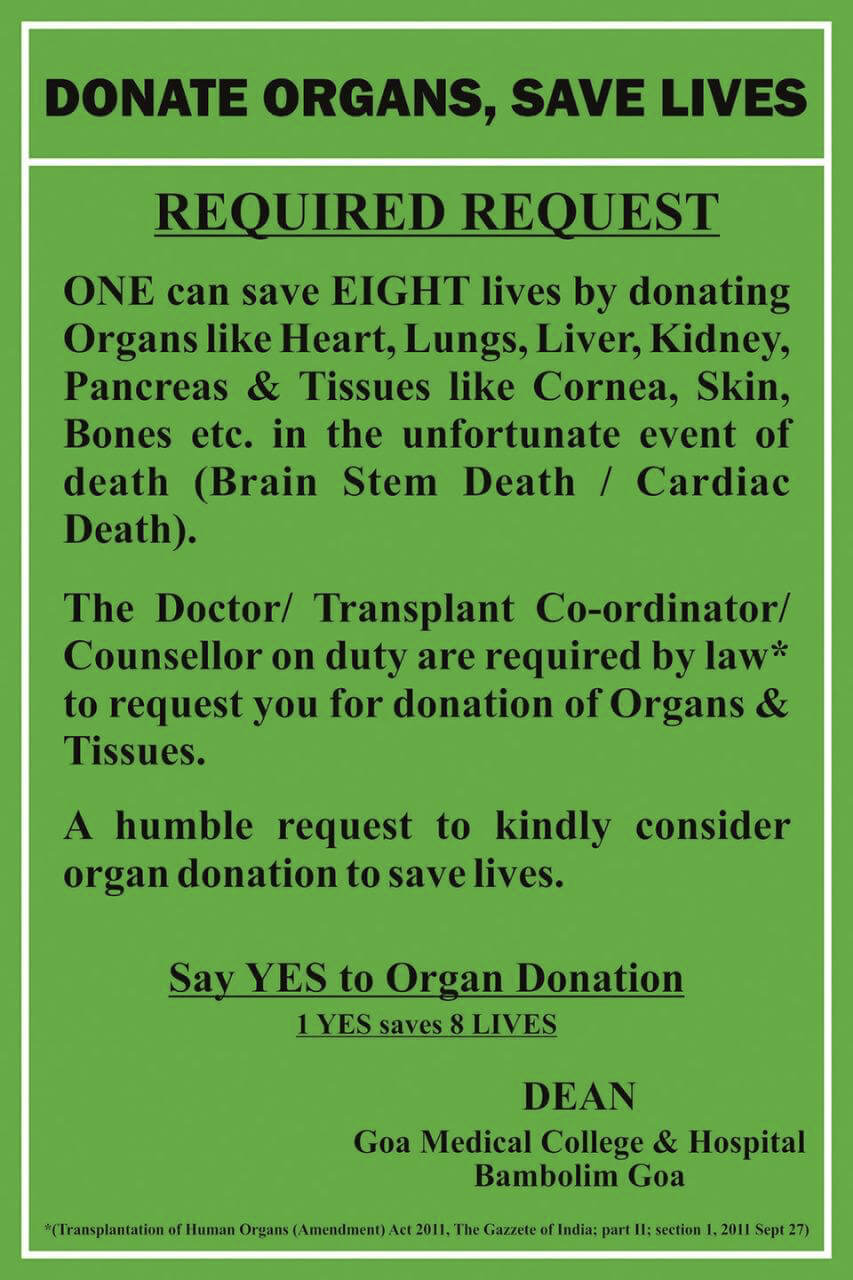
How to pledge as an Organ Donor ?
You may pledge to donate your organs by signing up as a donor on www.notto.mohfw.gov.in or Link: https://forms.gle/e52ENLLqSWQxjUXWA. For offline registration, kindly download Form 7 from our website and submit it to SOTTO Goa or email it to sotto-goa@gov.in. On the driving license application too, one can pledge as donor.
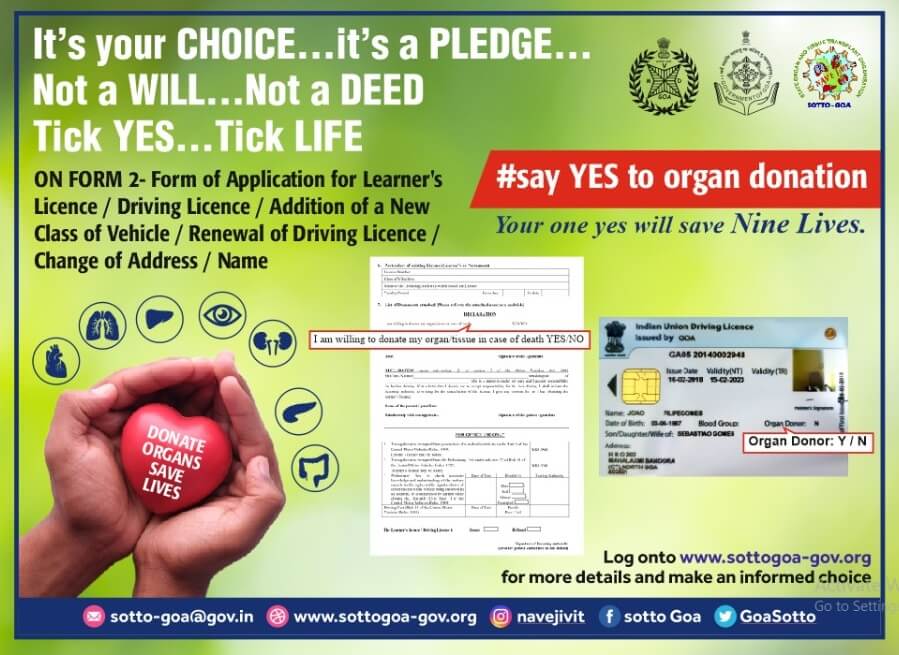
PLEDGE HAS NO LEGAL BINDING. NO CONSENT FROM FAMILY, NO DONATION
Is Organ Donation & Transplantation Legal?
Yes, Transplantation of Human Organs Act (THOA) 1994 regulates removal, storage and transplantation of organ for therapeutic purposes and prevents commercial dealings in human organs. Amendment 2011 THOTA & THOA Rules 2014 have been adopted by our state.
Whom to report any unlawful practices?
Kindly report it to the state appropriate authority viz. Secretary Health Government of Goa. No court other than that of a Judicial Magistrate of the first class shall try any offence punishable under this Act. The complainant is the state appropriate authority.
As per THOA 2011, offenses/punishments are as follows:
Punishment for removal of human organ & tissue or both without authorityup to 10 years and a fineup toRs. 5 lacs.Punishment for commercial dealings in human organ up to 5-10 years and a fine betweenRs. 20 lacs to Rs. 1 crore
Organ Donation-At Hospital or Home?
Organ Donation is only possible if the potential organ donor is admitted when the patient dies in the I.C.U. and is certified Brain dead. No vital organs can be retrieved if the death occurs at home.
Tissue (Cornea) Donation-At Hospital or Home?
The tissues like cornea (eyes) & skin can be retrieved within 6 hours even if the individual dies at home.
Kindly follow these steps for corneal donation:
- On death, inform eye bank immediately.
- Close eyes and place wet cotton over lids (to keep cornea moist & healthy)
- Switch off Fans.
Is the donor’s body disfigured after Organ Donation?
The organs are retrieved in the operation theater and there is no disfigurement. There is a midline incision on the body which is sutured post retrieval just like any other surgery performed on living persons. After organ donation the donor body is returned to the family for performing final rites.
Is there any Financial Transactions involved?
NO compensation or payment for donation of organs is permissible under THOA 1994.The family is not charged for any procedure/investigations after the consent for organ donation is given in private sector.
NO HUMAN ORGANS CAN BE BOUGHT OR SOLD.
Can one donate body to a teaching institution after organ & tissue donation?
Usually, Bodies are not accepted for teaching or research purposes after retrieval of organs / tissues or if there has been a post-mortem examination. However, if only the corneas are donated, a body can be used for this purpose.
How can you help in increasing Organ Donation?
• By becoming an organ donor, and talking to your family about your decision of saving lives of others.
• By promoting organ donation by motivating people at home, at work place, in your community and in your society.
If I have any medical condition can I pledge as an Organ Donor?
The medical suitability of the organ is determined at the time of Brain death. Irrespective of age and underlying medical conditions the organs are utilized if determined to be of normal function.
Whom should I contact to enlist for deceased donor organ transplant programme?
If you wish to undertake a transplant, kindly discuss with your treating phycisian. Your fitness evaluation will be performed as per institutional protocol and the transplant coordinator of the transplant hospital will enlist you. A score is generated by SOTTO as per medical criteria and enlisting is completed. The waiting list is blood group based viz. A, B, O, AB. For any further information (SOTTO Registration Number, Patient Rank, etc) kindly contact the Transplant coordinator.





